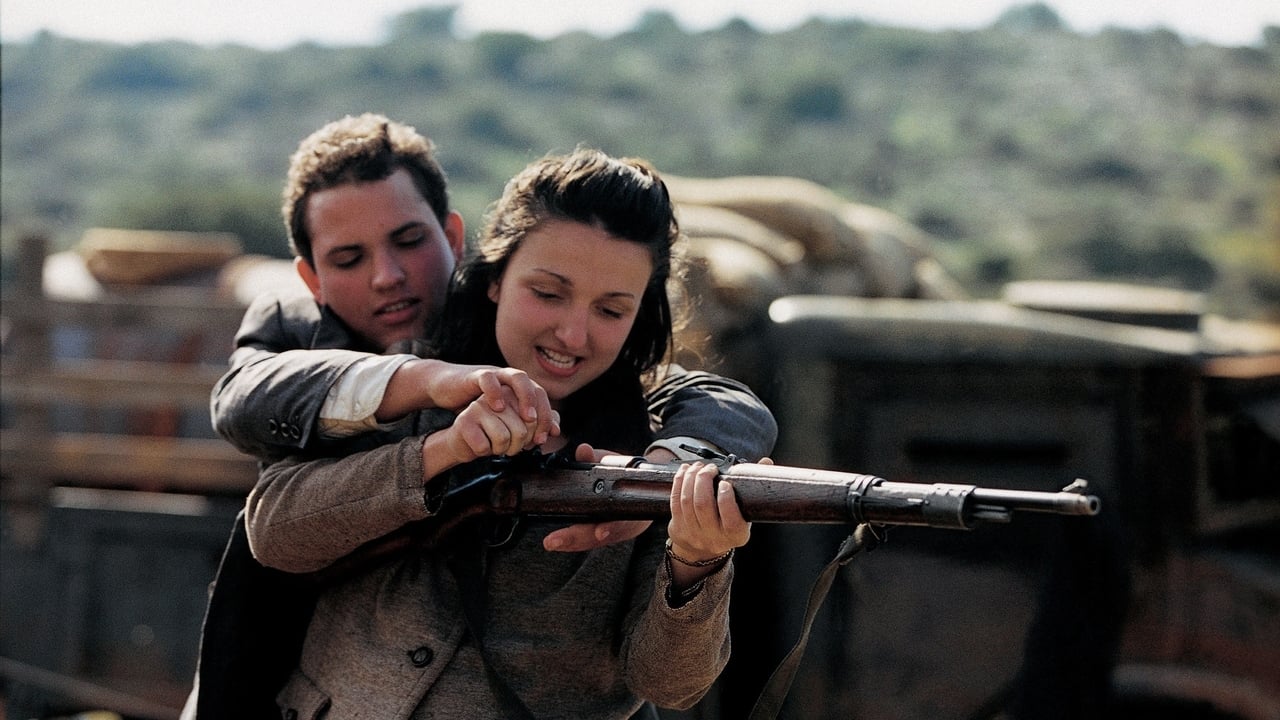

i must say that i am surprised. i didn't want to see that movie because i assumed that if it was created by Amos gitai i shouldn't expect to enjoy it.i saw kipur before and free zone and i didn't like it. but i must be honest that i actually cried in the movie because it is so sad and its very close to the story of my family. all of my family are Holocaust survivors.my grandmother and her husband and two children came to Israel on a ship.her husband was sent immediately to fight in the front in order to help the besieged Jerusalem and she never heard from him ever since.we finally found his grave 10 years after she past away.so i definitely sympathized with menachem and his girl. that was the realty for many Holocaust survivors that came to Israel and i think that this is what yanosh the main charged is lamenting when he says;*we have no history,the non-Jews did our history for us,not we,we would have never made it the way it was,we couldn't do anything to stop them*.the battle scenes in the movie are very realistic and exciting though very tragic .the common fighting of both man and women in the battle field is also very impressing. the way of fighting described in the movie is very typical for the war of independence and the fact that the camera is always on the attacking side and doesn't give a full picture of the battle zone or the view from the enemy angel and actually showing the viewer how a battle go in realty from the fighter point of view meaning allot of noise,yelling and screaming,explosions,confusion. this is very different from traditional war movies that show in different shots one side action and the other side reaction like a soldier is shooting and then in the next picture you see an enemy soldier is getting hit on the other side and the noise and screaming is usual buffered.the surprising point of the movie is that the one of the main characters of the movie was in real life an Arab-Jew that was known for its anti-Israeli opinions but in the movie he play a brave Jewish fighter.on top of that the same fighter is talking to Arabs that flee the country and while doing so he repeat the Israeli opinion on the war that say that the Arabs that fled the country escaped it as oppose to the Arab view that claim that they were all physically depopulated by the Jews. gitai is also touching one the war myths about the 35 soldiers that were sent to transport food and medicine to Jerusalem and found and old arab man on the way and spare his life after a long moral argument among them self but after they realist him he called all the Arab villagers and they all came and killed the soldiers and mutiled their bodies.i recommend every one to see the movie,though i don't think that movie is better then *exodus*with Paul Newman and *giant shed* with kirk Douglas when it come to describe the war of independence.
... View MoreThis movie is perhaps the slowest and most boring film I have ever seen. It is a pretentious attempt by Amos Gitai to remake Israel's national birth myth in his slow and artistic style. However, this time he fails miserably. From the opening scene that takes 10 minutes before anyone even opens their mouth the the closing speeches that are so melodramatic that they don't at all fit in with the otherwise painfully realistic piece, the movie is a disaster all the way through. In addition to its plodding style and one dimensional characters the movie is rife with factual errors. It mention fictional ghetto revolt, depicts the British army as a weak and unmotivated school marching band that speaks in American accents and seems to condense an entire year of war and struggle into one day. This movie is both a horrible depiction of Israeli history and a disastrous piece of entertainment and I would only recommend it to those who are in desperate need for a long sleep. Please do not see this embarrassment of a movie unless forced to by a man with a large gun.
... View MoreI'm not sure I got what I was supposed to get out of this film. As a piece of cinema it was an interesting way to shoot a low budget movie. With long, almost entirely wide-angle shots that hardly move at all, (except for a magnificent opening sequence and some hand-held work later on) it's staged and paced like a series of short plays. Some of the settings are just too simplistic; visually there isn't a lot going on besides the stories of the people coming in and out of the frame. There's no main protagonist in the film; numerous characters come and go, unresolved, sharing nearly equal screen time, but never quite enough of it to make any one of them more than a two-dimensional expression of a social theme. This dispassionate attitude gives "Kedma" a very documentary feel for the first two acts. It is the third act which is confusing, and even as a Jew with family in Israel, I feel severely underqualified to interpret Amos Gitai's true intentions with it. Watched with one set of eyes, it could be called a relatively simplistic portrayal of the birth of a nation, which throws its hands up to a certain extent and spreads the blame for the current situation around widely enough to defuse the certain blowback this film was to receive from the Orthodox community. On the other hand, in blaming Christianity, the Talmud and the Messianic tradition for enforcing the diaspora mentality over the past 2000 years, it stops right on the doorstep of declaring the modern State of Israel a product of the Jews' inheritance of the Nazi mentality which drove them there in the first place. Now: This isn't what I'm saying, but it might well be what the film is saying. At the very least it states boldly that the heroic Sabra stance is nothing more than the bitter side of the slave mentality, an ongoing form of self- flagellation. Only, the movie doesn't give you any inkling that this is where it's taking you as it leads you on in documentary form; and the result is definitely shocking. This is not a movie which apologizes for any outburst of emotion; nor does it pay much homage to the myth of the historical Maccabee. In short, it is about the weak preying on the weaker. Whether or not its stance is correct or covers the entire picture, again, I'm not qualified to say. There are certainly several other sides to the conversation than the one this film snakes its way into advancing. It's not a coincidence, either, that "Kedma" is the name of the refugee ship the Jewish characters arrive on; this movie, if nothing else, is the anti-"Exodus." None of the above, by the way, makes this film particularly enjoyable to watch. But if you like watching painful and well-crafted work that makes you think, well...it's still not that enjoyable to watch, but at moments it's completely riveting.
... View MoreA group of Jewish immigrants arrive in Palestine, after a travel in the vessel Kedma, to live in a kibbutz. While resting on the beach after the disembarking, British troops shoot them, and some of them escape with the support of a Jewish platoon. Sooner they are ambushed by Arabian resistance, who are trying to protect their lands against the Jewish invasion. Yesterday I saw 'Kedma' on DVD and I confess that I was completely disappointed with this low-budget and personal movie. The back cover of the DVD and the Plot Outline of IMDb provide important information about the 'when' the story takes place, which I have not seen in the movie. The story happens in May 1948, shortly before the creation of the State of Israel. There is also a boring speech of one of the survivors about the fate of the Jewish people. My vote is six.Title (Brazil): 'Kedma'
... View More